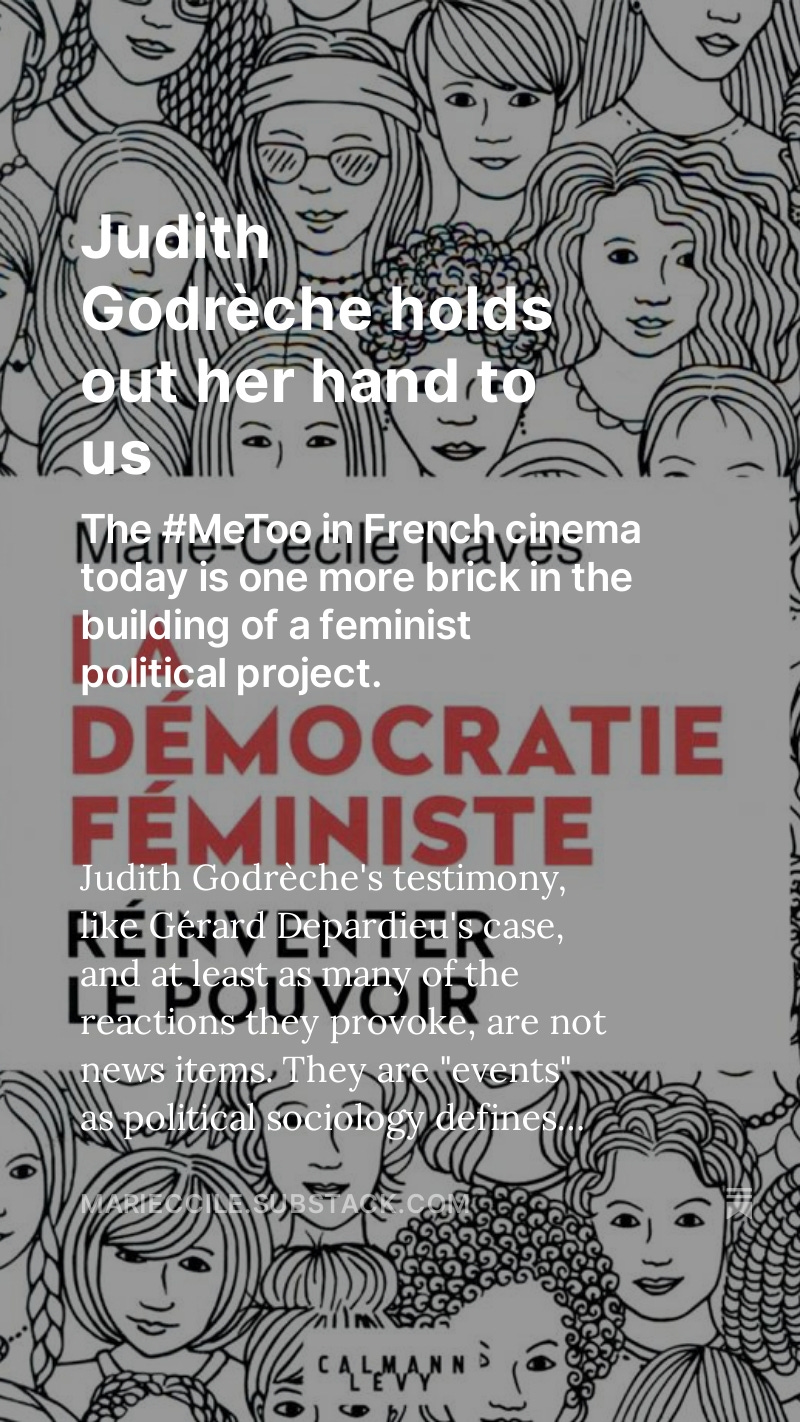Judith Godrèche Holds out Her Hand to Us
Publié le 10 mars 2024The #MeToo in French cinema today (« l’affaire Godrèche ») is one more brick in the building of a feminist political project. New post on my Substack blog, 10 March 2024.

Judith Godrèche’s testimony, like Gérard Depardieu’s case, and at least as many of the reactions they provoke, are not news items. They are « events » as political sociology defines them: they mark a turning point, they speak for the times. They do not happen by chance. They show that the gap is wide between an old world that believes itself to be strong and superior, but has understand that it is no longer invincible, and a fundamental, unstoppable movement demanding an end to violence against women (and children), and proposing a renewal of politics.
On the radio station “France Inter” and in the daily “Le Monde”, Godrèche clearly exposes the workings of a male domination of which she was a victim and which she refuses her children fall victim to. This domination is not simply the work of isolated individuals. It is firmly rooted in the very structures of a society that has not only long accepted it (and in many respects still does), but has also encouraged and promoted it. Denying this reality is the latest anti-feminist, not to say misogynist weapon drawn by the men (sometimes even some women) who refuse to question themselves. For whom submission is an irreplaceable source of pleasure. Those for whom dignity and respect for others, in a democracy, represent a loss of power.
Because what is at stake with Benoît Jacquot, Gérard Depardieu, Jacques Doillon and others is not just to say stop to sexist and sexual violence. What we are being told is also the need to offer viewers other representations of the world, works that show something other than this domination. And finally, the defenders of these predatory filmmakers « in the name of art » do not accept this diversity of viewpoints either. By refusing to accept a narrative other than their own (that of rape culture in many films), they are also refusing to share the creative and artistic narrative (and therefore, let’s face it, to share screens, funding, fame – in other words, power and money). Cinema would be limited to « their » cinema, which used to be plebiscitary.
In this respect, the #MeToo in French cinema that is taking place before our very eyes today, is not well received by those who intend to continue imposing the frameworks of speech, and confiscating that of others, who should be discredited and disqualified. They tell them: « you do not belong here ».
Feminism has been showing all this for decades.
And society cannot, on the one hand, say to women « free your speech », and on the other « we do not want to hear you, you are lying » or « come on, what you are saying is not that serious ». Laughing at the words of an old comedian who said in a recent live broadcast: « if my wife leaves me, I shall kill her ». Smiling with an old TV host who also recently ridiculed a female sports journalist who has denounced the sexism of her profession. From books to TV shows, masculinists are clamoring to be muzzled: hegemonic masculinity is wavering and cannot stand it.
Because it aims to maintain gendered roles and interactions, patriarchy has always endeavored to prevent or discourage women from entering the register of protest. But protest calls for proposal. And if we decide to « transform anger into pleasure », we can « experience the pleasure of getting out of it », as the philosopher Elsa Dorlin writes.
Feminism is a global project for transforming society, overturning the established order, denouncing a continuum of violence (ranging from insult to rape and murder). Let’s say it again: feminism is a major asset for enriching democracy.
But beware, it is costly: it means breaking with an intellectual laziness which for years has let political parties point the finger at an evil « wokeness monster » rather than think and formulate a forward-looking project for society. A philosophy of collective life via new links, new mediations, new freedoms. One that would enable us to move towards a more inclusive, more creative, more optimistic, less hateful, less embittered « We ». This would not be a weak society. In fact, the opposite would be true: by protecting the most vulnerable and giving them the place they deserve, such a society would be much stronger.
